| Sendedatum | 2009-02-15 21:10:57 |
|---|---|
| Ausgabe | 81 |
hier eine weitere Ausgabe des beliebten Newsletters für Masochisten und Weltuntergangssekten. Je nach Newsreader kann die Darstellung weniger als perfekt befriedigend sein, daher könnte sich ein Blick auf die Onlineversion lohnen, die außerdem verschlagwortet ist.
Quelle
Inhaltsverzeichnis:
- Bleak forecast on fishery stocks
- Catastrophic Fall in 2009 Global Food Production
- CO2 hits new peaks, no sign global crisis causing dip
- Penguins in peril as food search turns into marathon
- Global Warming Changing Birds' Habits
- 60 Prozent Umsatzrückgang bei Nvidia Meldung vorlesen und MP3-Download
- Dry bulk freight surge 'could be shortlived'
- Out-of-work ships used as storage for unsold cars
- Failure to save East Europe will lead to worldwide meltdown
- Hybrid-Bankanleihen im Wertverfall
- Half of all CDOs of ABS failed
- Nachrangige Anleihen
- JWM Partners considers new fund
- Hedging? Glücksspiel?
- LyondellBasell-Pleite - schlecht für die Banken
- European yards face collapse in credit crisis
- Europa im Januar 2009: 26.5% weniger Autos verkauft als Januar 2008.
- Europa: Industrieproduktion im Dezember 2008
- Afghanistan: Waffen vermißt
- Australien: Babcock & Brown insolvent
- China's wheat production may drop
- China declares an emergency amid worst drought in 50 years
- China to stick with US bonds
- China: Stahlexport
- China: Noch ein Einzelbericht (2)
- Chinas Stromerzeugung im Januar 2009
- Chinas Importe und Exporte im Januar 2009
- More terrible trade numbers from China
- Dubai's six-year building boom grinds to halt as financial crisis takes hold
- Estonia’s Economy Contracts At Record Pace At The End Of 2008
- France Enters Recession
- Deutsche Wirtschaft schrumpft mit Rekord
- Auftragseingang im deutschen Maschinen- und Anlagenbau
- HSH Nordbank verbucht Milliardenverlust
- Fass ohne Boden
- WestLB
- German Industrial Output Drops by the Most on Record
- Italy’s Recession Deepens
- Unikredit
- Losses Of Canadian Credit Card Firms Forecast To Hit $800 Million
- Latvia’s Economy Falls At A 10.5% Rate In Q4 2008
- Rußland: Gazprom Neft's oil exports fell 2.4% in 2008
- Rußland: Gegendemonstrationen
- Spanien
- Südkorea, Taiwan
- The Czech Republic Probably Entered Recession At The End Of 2008
- UK external accounts continue to deteriorate
- UK: Housing Equity Withdrawal
- UK: Demand for office space falls at record pace
- UK: Demand for grammar school places surges
- HBOS schreibt elf Milliarden Euro Verlust
- UK Manufacturing
- Drogendeflation im Großbritannien
- This is the worst recession for over 100 years
- Hungary’s Second Recession In Two Years Worsens
- A 10-Year Stretch That’s Worse Than It Looks
- USA: No one home: 1 in 9 housing units vacant
- U.S. corn for ethanol to rise, growth to slow: USDA
- USA: Consumers Cut Food Spending Sharply
- S&P heads to first quarter ever of negative earnings
- USA: Was die FDIC für Kredite bekommt
- NAR: Distressed Sales Accounted for 45% of Q4 Activity
- Fannie, Freddie Funding Needs May Pass $200 Billion, FHFA Says
- USA: ‘No Prospect for a Profit’ on Fed’s Bear Assets
- USA: ISM Januar 2009
- USA: Cumulative Job Losses: Getting Worse With Time
- USA: Kreditkarten
- US-Autoverkäufe im Januar 2009
- Und es kommt _noch_ schlimmer...
Inhalt:
Klimawandel und Weltmeere:
Changing ocean temperatures and currents will force thousands of species to migrate polewards, including cod, herring, plaice and prawns.
By 2050, US fishermen may see a 50% reduction in Atlantic cod populations.
-50% Kabeljau in 2050, weil der weiter nordwärts wandert...
Ich weiß ja nicht, aber die zunehmende Übersäuerung kann solche Kalkulationen über den Haufen werfen.
The model predicts an increased catch in the North Sea - benefiting fishermen from Nordic countries.
Naja, dafür jedoch wird die Ostsee wohl weniger Fisch produzieren.
Thirty-three nations in Africa, Asia and South America are highly vulnerable to the impact of climate change in fisheries, according to scientists from the World Fish Centre.
Of these, 19 were already classified by the United Nations as "least developed" because of their particularly poor socioenomic conditions.
"Economically, people in the tropics and subtropics likely will suffer most, because fish are so important in their diets and because they have limited capacity to develop other sources of income and food," said Edward Allison, director of policy, economics and social science at WorldFish.
Ich weiß jetzt nicht, in wieweit ich der Quelle trauen möchte, aber einen Hinweis auf eine weniger als optimale Entwicklung gibt das allemale:
[...]
The countries that make up two thirds of the world's agricultural output are experiencing drought conditions. Whether you watch a video of the drought in China, Australia, Africa, South America, or the US , the scene will be the same: misery, ruined crop, and dying cattle.
Die Graphik zeigt die Länder der Welt nach Wert der landwirtschaftlichen Produktion. Beim Überfahren des Bildes mit der Maus wird stattdessen eine Weltkarte

Der Artikel geht dann durch die Liste der betroffenen Länder, und kommt zu dem Fazit:
Low stocks of foodstuff make the world's falling agriculture output particularly worrisome. The combined averaged of the ending stock levels of the major trading countries of Australia, Canada, United States, and the European Union have been declining steadily in the last few years:
2002-2005: 47.4 million tons
2007: 37.6 million tons
2008: 27.4 million tons
These inventory numbers are dangerously low, especially considering the horrifying possibility that China's 60 million tons of grain reserves doesn't actually exists .
Global food Catastrophe
The world is heading for a drop in agricultural production of 20 to 40 percent, depending on the severity and length of the current global droughts. Food producing nations are imposing food export restrictions. Food prices will soar, and, in poor countries with food deficits, millions will starve.
Es ist schön zu wissen, daß auch diese fürchterliche Wirtschaftskrise nicht alles ändert, was wir liebgewonnen haben: Sie hat bisher keine Auswirkungen auf die CO2-Produktion gehabt.
"The rise is in line with the long-term trend," Kim Holmen, research director at the Norwegian Polar Institute, said of the measurements taken by a Stockholm University project on the Arctic archipelago of Svalbard off north Norway.
Levels of carbon dioxide, the main greenhouse gas from human activities, rose to 392 parts per million (ppm) in the atmosphere in Svalbard in December, a rise of 2-3 ppm from the same time a year earlier, he told Reuters.
Was da nicht mal so ein Kyoto-Protokoll?
Dee Boersma, of the University of Washington in Seattle, said that Punta Tombo penguins were now routinely swimming 25 miles farther on their foraging expeditions than they did a decade ago.
“That distance might not sound like much, but they also have to swim another 25 miles back, and they are swimming that extra 50 miles while their mates are back at the breeding grounds, sitting on a nest and starving,” she said.
The longer foraging trips have contributed to the colony's decline: penguin numbers have fallen by more than 20 per cent in the past 22 years, leaving only 200,000 breeding pairs today.
25 Meilen hin und 25 zurück = 85 Kilometer mehr.
Und woran liegt's?
[...]
Oil pollution and overfishing are also having a significant effect on penguin feeding patterns. Details of the research were presented yesterday at the American Association for the Advancement of Science conference in Chicago.
Klimawandel, Umweltverschmutzung und Überfischung.
The purple finch was the biggest northward mover. Its wintering grounds are now more along the latitude of Milwaukee, Wis., instead of Springfield, Mo.
Bird ranges can expand and shift for many reasons, among them urban sprawl, deforestation and the supplemental diet provided by backyard feeders. But researchers say the only explanation for why so many birds over such a broad area are wintering in more northern locales is global warming.
Dafür, daß der Klimawandel erst mit dem Regierungswechsel aufgefallen ist, ist er wirklich bemerkenswert schnell...
Vielleicht ist der Bedarf an übertrieben hitzeerzeugenden, lauten Graphikarten doch noch so groß wie der an Nahrung - oder vielleicht sind die Dinger vom letzten Jahr auch längst gut genug...
Das Ansteigen des Baltric Dry könnte nur kurzlebig sein:
[...]
“In addition, temporary iron ore shortages appeared to develop at the end of 2008, following a collapse in domestic iron ore production and a reduction in port stocks.”
This has resulted in restocking by Chinese steel mills, with 55 vessels now reported to be outside China ports waiting to unload cargoes.
The recovery could prove to be a shortlived one, as there is no evidence of an increase in demand for steel in China. A major downturn in iron ore imports continues in Japan and Europe as hefty steel production cuts are implemented.
Ein Auffüllen der Lager nachdem man abgewartet hat, bis die Erzpreise verfallen waren...
Die eigenen Lagerplätze sind voll, verkauft bekommt man das Zeug auch nicht, und die Lager an den Häfen sind voll. Wohin mit den neu gebauten Autos?
The move is a rare positive development for operators of the world's fleet of 640 car carriers, which face sharp falls in traffic. At the same time, 70 new ships, mostly larger than their predecessors, are due for delivery this year alone.
Man parkt sind in Autotransportschiffen - zu denen dieses Jahr locker 10% der Kapazität hinzu kommen.
Seufz.
Ambrose Evans-Pritchard wirkt leicht alarmiert:
Austria's finance minister Josef Pröll made frantic efforts last week to put together a €150bn rescue for the ex-Soviet bloc. Well he might. His banks have lent €230bn to the region, equal to 70pc of Austria's GDP.
"A failure rate of 10pc would lead to the collapse of the Austrian financial sector," reported Der Standard in Vienna. Unfortunately, that is about to happen.
The European Bank for Reconstruction and Development (EBRD) says bad debts will top 10pc and may reach 20pc. The Vienna press said Bank Austria and its Italian owner Unicredit face a "monetary Stalingrad" in the East.
Österreichs Finanzminister versuchte letzte Woche ein Rettungspaket über 150 Mrd. EUR für den Exsovietblock zusammenzubekommen, um ein monetäres Stalingrad zu vermeiden.
Dieses Jahr muß Osteuropa 400 Mrd. Dollar an Krediten zurückzahlen oder verlängern - ein Drittel des BIPs der Region.
"This is the largest run on a currency in history," said Mr Jen.
Das ist möglich, ja. Und ebenso möglich ist, daß die Russen echte Schwierigkeiten haben werden, ihre Schulden zu begleichen.
So weit, so richtig - die US-Banken sind in Osteuropa nicht investiert.
Und das ist durchaus ein gefährliches Problem.
They are five times more exposed to this latest bust than American or Japanese banks, and they are 50pc more leveraged (IMF data).
Spain is up to its neck in Latin America, which has belatedly joined the slump (Mexico's car output fell 51pc in January, and Brazil lost 650,000 jobs in one month). Britain and Switzerland are up to their necks in Asia.
Whether it takes months, or just weeks, the world is going to discover that Europe's financial system is sunk, and that there is no EU Federal Reserve yet ready to act as a lender of last resort or to flood the markets with emergency stimulus.
Ich bin normalerweise sehr skeptisch, wenn dieser Autor über die Eurozone schreibt (eingefleischter Hasser des Euro), aber er dürfte insgesamt durchaus recht haben: Wir werden sehr bald sehen, wie verheerend sich die Investitionen von Banken aus der Eurozone, Großbritannien und der Schweiz in den Emerging Markets auswirken werden.
[...]Ukraine has unravelled. The country – facing a 12pc contraction in GDP after the collapse of steel prices – is hurtling towards default, leaving Unicredit, Raffeisen and ING in the lurch.
[...]
Berlin is not going to rescue Ireland, Spain, Greece and Portugal as the collapse of their credit bubbles leads to rising defaults, or rescue Italy by accepting plans for EU "union bonds" should the debt markets take fright at the rocketing trajectory of Italy's public debt (hitting 112pc of GDP next year, just revised up from 101pc – big change), or rescue Austria from its Habsburg adventurism.
Ok, das muß sein: AEP sagt den Zerfall der Euros voraus.
Und noch etwas:
Spaniens Banken steht möglicherweise auch ein unangenehmes Erwachen ins Haus.
Ausgestanden ist die Krise noch lange, lange nicht:
Hybridkapital steht bei einer Insolvenz an zweitletzter Stelle, nachrangiger werden nur noch Aktionäre eingestuft. Die Ansprüche von Hybrid-Investoren werden erst nach allen erstrangigen Gläubigern bedient.
[...]
Seit Regierungen etwa in Deutschland oder Großbritannien zum Jahresanfang stark in den Markt eingegriffen haben, sind die Preise regelrecht abgestürzt: So verlor eine Benchmark-Tier-1-Anleihe der Commerzbank im Volumen von 1 Mrd. Euro seit Jahresanfang rund 60 Prozent, eine Benchmark-Anleihe von ebenfalls 1 Mrd. Euro der Deutschen Bank gut 38 Prozent, und ein entsprechendes Papier der Postbank im Volumen von 500 Mio. Euro rund 23 Prozent. Tier-1-Anleihen sind die nachrangigste Form von Kapital. Ähnliche Abschläge müssen Hybrid-Anleihen etwa der Bank of America hinnehmen.
Im Gegenteil: sie droht wieder Fahrt aufzunehmen.
The defaults have affected more than $300bn worth of these collateralised debt obligations, which were built from bits of other asset backed securities (ABS) such as mortgage bonds, other CDOs and structured bonds, or derivatives of any of these, according to analysts at Wachovia and Morgan Stanley.
By their records, the first three years of the market saw less than 100 deals sold per year and less than 10 per cent of those have defaulted. The number of deals done rose to 133 in 2005, less than 20 per cent of which defaulted, and 89 in just the first half of 2006, about one-third of which have defaulted.
However, the real peak of the market saw 147 deals done in the second half of 2006 and 172 done in the first half of 2007 – of which 68 per cent and 76.2 per cent, respectively, have now defaulted.
Eine hübsche Steigerung:
2004: <10%
2005: <20%
H1-2006: 33%
H2-2006: 68%
H1-2007: 76.2%
Nun muß ein Ausfall nicht unbedingt ein Totalausfall sein, von daher könnten die Verluste tatsächlich unter diesem Satz liegen, aber insgesamt war das keine gute Geldanlage...
Das ist ja nicht _so_ schlimm?
Und länger als kurzfristig denkt sowieso keine große Bank mehr.
http://www.ftd.de/boersen_maerkte/aktien/anleihen_devisen/:Portfolio-Anleihen-mit-zwei-Gesichtern/469970.html
Irgendjemand wird sich schon finden, der als erster die Zinszahlung streicht und diese Praxis damit bricht.
"Ganz hinten" heißt hier: Direkt vor Aktionären.
Auch da wird sich irgendjemand finden, der diese Freiwilligkeit wörtlich interpretiert.
Soso. Nachrangigkeit und "sehr lange Laufzeit" machen das also zu Eigenkapital.
Das ist also wie eine Hypothek - lange Laufzeit und absolut nachrangig (gegenüber Steuer, Unterhaltszahlungen, ...). Seufz.
Machen die Schuldner von dieser Möglichkeit nicht Gebrauch, erhalten Anleger statt des bis dato fixen Kupons anschließend eine zumeist hohe variable Verzinsung. Ein Beispiel: Falls der Touristikkonzern TUI seine Nachranganleihe nicht zum 20. Januar 2013 kündigt, kassieren die Gläubiger statt des festen Kupons von 8,625 Prozent eine Verzinsung in Höhe des Dreimonats-Euribor (aktuell 2,08 Prozent) plus einen Aufschlag von 7,3 Prozentpunkten. Derzeit kämen somit rund 9,4 Prozent zusammen.
Diese Anleihe notierte mal bei 107%, und sank seit April letzten Jahres langsam, dann im September und/oder Oktober sehr rasent, auf derzeitig um die 46%. Da wird wohl einigen Leuten bewußt geworden sein, daß sie gezockt haben.
The new fund could be set up within JWM Partners or in a new company, the paper said, citing the official.
The fund's launch remains some way off and could still fall apart, the paper said.
JWM, Ex-Chef des Hedgefonds Long Term Capital Management, möchte einen neuen Fond auflegen. Das wird sich der Mann sicher gut überlegt haben, und außerdem wird er sicherlich Argumente haben, warum die Kunden bei ihm anlegen sollen.
Ok, das mit dem "gut überlegt" entfällt...
... und ein Verlust von 40% ist kein gutes Argument.
Da investiert ein Hedgefont nur in eine einzige Firma (offensichtlich gehebelt), hat im Januar 40% verloren und insgesamt bereits 89% verloren...
The decline in Pershing Square IV fund was about four times that of Target shares in January because Ackman made his bet using options rather than owning the underlying stock, which tumbled 9.6 percent. Ackman said he will personally add another $25 million to the fund, and employees and board members will put up more cash.
“While PSIV and Target stock have declined materially, we still believe our fundamental investment case for Target stock will ultimately be realized, although not within the original timeframe we had initially estimated,” he wrote in the letter dated Feb. 5.
"We believe". Investment by Glauben. Gute Idee, das. Ganz offensichtlich.
Und warum glaubt der Fond, daß der Kurs von Target steigen wird? Vielleicht weil die so gut sind? Vielleicht weil sie in Krisen noch besser werden?
Nein, weil man deren Läden verkaufen und wieder mieten kann...
Nun ist das eine der Sachen, die in den letzten Jahren mit schöner Regelmäßigkeit daneben gegangen sind: Etwas zu verkaufen um es direkt wieder zu mieten.
Hier allerdings soll die Konstruktion wohl so sein, daß man den REIT erst gründet, die Immobilien da hineinbringt und zurückleast, und dann den REIT verkauft. Ob das in den USA, dem Land der fallenden Immobilienpreise und horrend steigenden Verluste mit Geschäftsimmobilien, zur Zeit angesagt ist?
ok, ok, wenn die Inflation richtig 'rein haut, bis dahin, klappt das vielleicht auch...
Wo hat der Fond sich eigentlich abgehedged?
Goldman Sachs Group Inc., Citigroup Inc., UBS AG, Merrill Lynch & Co. and ABN Amro Holding NV agreed to underwrite the $20.9 billion takeover of Houston-based Lyondell by Basell AF, a Rotterdam company controlled by Ukraine-born billionaire Len Blavatnik, in the second half of 2007. LyondellBasell Industries, the world’s biggest maker of polyolefins used in products ranging from bottle caps to auto parts, filed for bankruptcy last month as demand evaporated in the global recession.
The financing includes $8 billion of low-ranking loans still held by the banks that may be worthless, said three people with knowledge of the situation who declined to be identified because the information isn’t public. That would eclipse about $5 billion of potential losses from Tribune Co., the Chicago- based media firm that filed for bankruptcy protection Dec. 8.
Dabei frage ich mich aber Folgendes: wie können die besten und klügsten der Geschäftswelt (ich denke da an die Banker von GS, C, UBS, ML und ABN) auf 8 Mrd. sitzen bleiben?
The large capital requirements of the shipbuilding industry and the lack of affordable finance have combined to “jeopardise the economic survival” of the European Union industry, said Brussels Industry Commissioner Gunter Verheugen.
Aha, Herr Verheugen hat ausgeschlafen.
Mir gefällt der Ton nicht (aber Verheugen hat kaum je etwas gesagt, was mir gefallen hätte).
Bitte? Das wird ja immer schöner... "50% der Schiffsflotte der Welt ist bestellt".
Banks are pulling credit lines even if companies are viable, simply out of fear, Mr Luken said. “Member states do not have the means to tackle this crisis,” he said, in reference to the danger that certain countries will want to intervene to protect their yards. “We have to trust in Europe.” Newbuilding orders are thought to have crashed 90% in the final quarter of last year.
Gut für die Banken, die ihre Kreditlinien kürzen, kann ich da nur sagen. 90% Auftragseinbruch.
So weit, so schlecht, aber...
Die 14,2% wiederum verdanken wir die Abwrackprämie:
Auf http://www.wissen.de/wde/generator/wissen/services/nachrichten/ftd/PW/473828.html heißt es jedoch:
Bitte was? 220000 Autos zusätzlich?
[...]
In Germany, Europe’s largest economy, plant and machine makers plan to reduce output and cut as many as 25,000 jobs this year as sales falter, the VDMA machine makers association said this week. Production may fall 7 percent in 2009 after rising 5.4 percent last year, the Frankfurt-based association said. Overall German output fell 12.4 percent in December from a year earlier and was down 4.9 percent from November, today’s report showed.
12% ist nicht mehr einfach nur schlecht.
http://econompicdata.blogspot.com/2009/02/european-industrial-production-december.html
Econompicdata hat das visualisiert: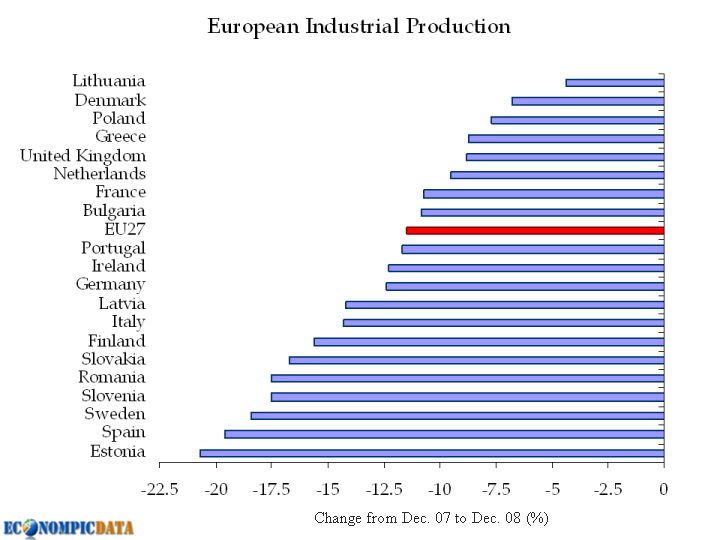
Waffen können einfach verschwinden?
Warum überrascht mich das eigentlich nicht?
[...]
The military also failed to properly account for an additional 135,000 weapons it obtained for the Afghan forces from 21 other countries.
200000 Waffen sind da einfach weg. Oder besser gesagt: Sie sind nun wahrscheinlich da, wo man sie nicht haben will.
Babcock & Brown, australischer Immobilienladen, ist pleite:
Australia’s five biggest banks have almost A$870 million of loans at risk with Babcock, while overseas lenders including Royal Bank of Scotland Plc have almost A$2 billion on the line, according to estimates by UBS AG. Babcock had interest-bearing debt of A$9.6 billion when it last published accounts in August.
und hinterläßt Schulden von A$9.6 Mrd, von denen Banken wohl rund 3 Mrd. abschreiben dürfen.
Die Besitzer haben sowieso kaum noch etwas zu verlieren...
Since October of 2008, North China and the region between the Yellow River and Huai River have been plagued by a drought, for precipitation has been 80% to 95% less in 2009 compared to a normal year.
BOABC predicts that winter wheat production may drop to 100.1 million tonnes during the 2009-2010 season, a slip of 5.6 million tonnes or 5.4% on the year-on-year basis. But the market balance is not likely to be much affected. Year-end wheat inventory is estimated to be 52 million tonnes and the safety index may drop 1.8% on the year-on-year basis.
BOABC presumes that the Chinese government may take several measures to ensure wheat production and protect farmers' interests. The government could increase cash subsidies to farmers for drought relief. Also, wheat procurement prices could increase by 10% to 15%.
Winterweizenproduktion -5.6 Mio. Tonnen -> 100.1 Mio Tonnen.
Nicht schlimm, selbst damit verbleiben 52 Mio. Tonnen Reserven. Ich hoffe für die Chinesen, daß diese Reserven tatsächlich existieren...
Not a drop of rain has fallen on Beijing for more than 100 days, the longest dry spell for 38 years in a city known for its arid climate. The Office of State Flood Control and Drought Relief Headquarters described the drought as a phenomenon “rarely seen in history” as the Government declared a state of emergency.
In Teilen Chinas herrscht die schlimmste Trockenheit seit 50 Jahren.
The China Daily newspaper said that it was the worst drought since 1951 in the province, which is a major supplier of winter wheat. Major state-run newspapers carried reports of the drought on front pages and news broadcasts showed dry, cracked fields with crops withering in the earth.
[...]
One agriculture expert said that the drought could reduce annual production in major wheat-growing areas by 2 to 5 percent. Ma Wenfeng said: “The severest-hit regions of Henan and Anhui will see their wheat harvest down by about 20 percent.”
Mr Luo, speaking at the Global Association of Risk Management’s 10th Annual Risk Management Convention, said: “Except for US Treasuries, what can you hold?” he asked. “Gold? You don’t hold Japanese government bonds or UK bonds. US Treasuries are the safe haven. For everyone, including China, it is the only option.”
Mr Luo, whose English tends toward the colloquial, added: “We hate you guys. Once you start issuing $1 trillion-$2 trillion [$1,000bn-$2,000bn] . . .we know the dollar is going to depreciate, so we hate you guys but there is nothing much we can do.”
Das ist schon ein Zitat wert.
China\\\'s steel exports dropped 5.5 percent year-on-year in 2008 after consistent growth for about a decade, the General Administration of Customs said yesterday, warning of further challenges to the industry this year.
The country\\\'s steel exports dipped to 59.23 million tons last year, while the export value increased 43.8 percent year-on-year to $63.44 billion, Customs said on its website.
Steel exports dropped 40 percent year-on-year to 1.91 million tons in January and the import of iron ore reached 32.65 million tons, down 5 percent from December 2008.
Chinas Stahlexport 2008: -5.5% gegenüber 2007.
Gefallen von 7.68 Mio. Tonnen im August 2008 auf 2.95 Mio. Tonnen im November...
Dazu hab' ich bei Reuters diese Graphik gefunden:
In einem Artikel, der sich mit der Frage beschäftigt, ob die chinesische Führung das Richtige tut, finden sich folgende Brocken:
Similarly, in Beijing's Korean section, perhaps half of the 200,000-300,000 inhabitants ― mainly workers (and their families) who are paid by Korean companies that produce goods in China for export ― reportedly have gone home.
Geisterstädte an der Küste, und "vielleicht die Hälfte" der Koreaner Pekings sind nach Hause gegangen.
The country's major power producers produced only 250.3 million megawatt hours of power in the month, said an official with China Electricity Council (CEC) yesterday, who declined to be named.
This is the fourth consecutive month that the country has seen a negative growth in power generation. CEC statistics showed that thermal power generation in October, November and December last year fell 5.3 percent, 16.6 percent and 12.4 percent respectively.
Ich glaube nicht, daß sich China nicht in einer massiven und fürchterlichen Rezession befindet.
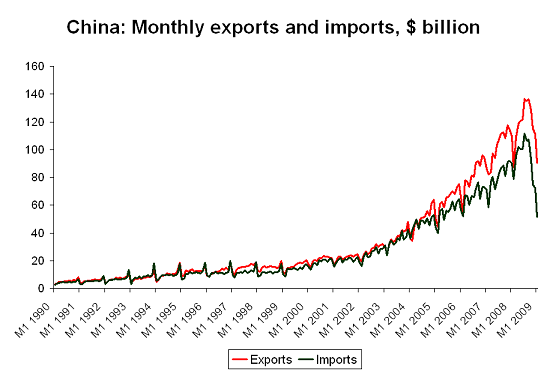
Für eine Land, daß dem Einbruch des Exports mit einer Verstärkung der Binnennachfrage begegnen will, ist es eine sehr ungewöhnliche Entwicklung...
Übrigens steht zu befürchten, daß der Einbruch der Exporte sich beschleunigen wird: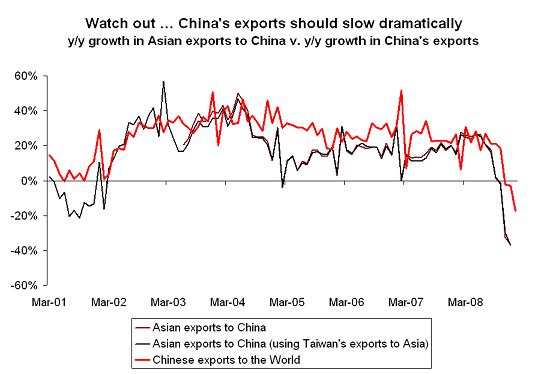
In some sense, it is hard to imagine a worse combination. China’s export are falling, making China understandably reluctant to allow its currency to appreciate. But China’s trade surplus is also rising … certainly in nominal terms and quite possibly in real terms. That isn’t good for the world.
At a time when the world is short demand, China seems to be subtracting from global demand not adding to it. The best solution: an absolutely enormous domestic stimulus in China.
Michael Pettis über Chinas Im/Exporte, den Handelsüberschuß und die Wirkung auf Chinas Lieferantenländer:
I know I have written about this many times, but I want to say again what that means for the global imbalance. The world’s consumers are experiencing a sharp contraction in demand. That contraction has to be “shared out” among all of the world’s producers. The decline in Chinese exports means that Chinese producers are absorbing part of that contraction, but the bigger decline in its imports means that Chinese consumers are contributing an even greater amount to the contraction in demand. The result, with net Chinese consumption contracting by more than net Chinese production, is that non-Chinese producers must absorb more than 100% of the contraction in demand from non-Chinese consumers. It will be hard to convince them that this is fair.
China wirkt effektiv als Verstärker der Krise - und das dürfte, m.M. nach, die verheerenden Exportzahlen der anderen asiatischen Nationen erklären.
Ein Abbau der globalen Ungleichgewichte wäre durchaus wünschenswert.
Die Hälfte der Bauprojekte der VAE ist auf Eis gelegt oder abgebrochen, und eine Menge Wolkenkratzer stehen halb fertig in der Wüstenstadt...
At the top of the island stands the Atlantis, a garish $1.5bn hotel complex with 1,539 rooms and a whale shark swimming in a 1 million-litre fish tank.
The Atlantis's $20m inauguration celebration, where the world's A-list celebrities were treated to 1.7 tonnes of lobster and 1,000 bottles of Veuve Clicquot, was promoted as the world's biggest party.
For Palm residents, it was followed by an equally impressive hangover. The value of their villas and apartments on the Palm fell by as much as 60% in just a few months.
Officials put the number of vehicles at 11. "No one believes that. There are 11 cars abandoned just on my street," said Anne, 26, a fashion editor from London. "Over the past two months I've been getting an email a day from people trying to sell their stuff. 'New Jaguar – need to sell before the end of the week'."
The Indian embassy is reportedly anticipating an exodus with 20,000 seats on flights to India already "bulk-booked" for next month.
Buses come to pick up 250 workers every night from one dusty street on the edge of Sonapur, a labour camp on the edge of the desert.
[blockquoteUnd Abu Dhabi]Thirty miles from the capital, dust rises from the barren horizon where a 10km-long building site is being turned into al-Raha Beach, an $18bn waterfront city, a joint venture between Aldar, Abu Dhabi's largest property developer, and Laing O'Rourke, the UK's largest construction company.
"A lot of staff have been moved over here from Dubai," said Paul, 35, a Laing O'Rourke project manager, raising his voice over the noise of JCBs.
"But it is all coming to a stop here too. There are mass redundancies now. We've gone from an expat workforce of about 1,000 to about 400. There are more waves of redundancies coming this week."
He said he could not be sure, but by his estimate more than half of the al-Raha development had been quietly shelved.
2009 dürfte sich als katastrophales Jahr für Dubai und Abu Dhabi herausstellen.
http://www.bloomberg.com/apps/news?pid=20601104&sid=aV0OuyJQqxr4
The average price of villas in Dubai fell 30 percent and for apartments 20 percent from September to December, according to the survey, which for the first time captured actual real-estate transaction prices in Dubai. The number of advertised listings climbed 10 percent from November.
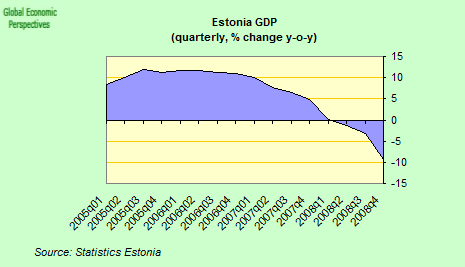
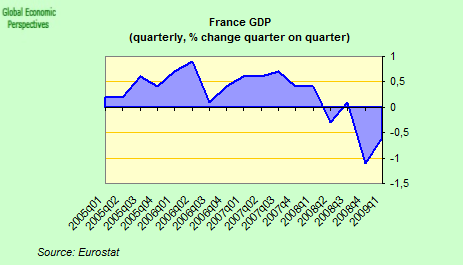
Annualisiert sind's also 8.4%. Damit liegen wir im früher als erwartet in meinem befürchteten 8-12%-Bereich...
Und die 2.1% sind deutlich schlechter als der Eurozonen-Durchschnitt von 1.5%. Da schlägt unsere Exportabhängigkeit voll durch...
aber trotz der Exportabhängigkeit hätte ich nie und nimmer damit gerechnet, daß Deutschland um 50% schneller abstürzt als die Eurozone insgesamt - immerhin sind wir Schwergewicht in der Zone...
Econompicdata hat das mal visualisiert:
http://econompicdata.blogspot.com/2009/02/euro-region-gdp-down-15.html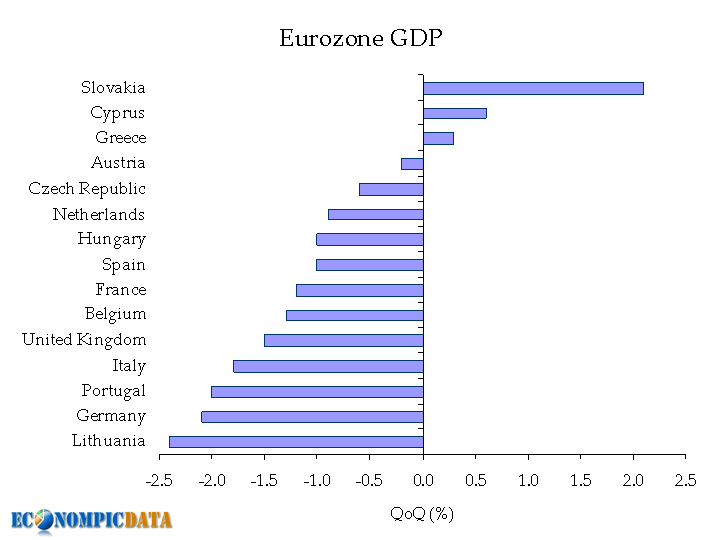
Ist es wirklich möglich, daß sogar Spanien und Großbritannien besser durch die Krise kommen? Wenn ja, warum?
http://fistfulofeuros.net/afoe/economics-and-demography/germanys-incredible-shrinking-economy/
Edward Hugh dazu:
Germany’s Incredible Shrinking Economy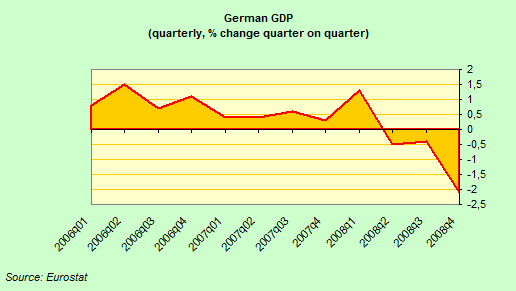
Der Auftragseingang im deutschen Maschinen- und Anlagenbau lag im Dezember 2008 um real 40 Prozent unter dem Ergebnis des Vorjahres. Das Inlandsgeschäft sank um 39 Prozent. Bei der Auslandsnachfrage gab es ein Minus von 41 Prozent im Vergleich zum Vorjahresniveau. In dem von kurzfristigen Schwankungen weniger beeinflussten Dreimonatsvergleich Oktober bis Dezember 2008 ergibt sich insgesamt ein Minus von 29 Prozent im Vorjahresvergleich. Das Inland verlor 28 Prozent, das Ausland ging um 30 Prozent zurück. „Das vierte Quartal 2008 ist damit das schlechteste Quartalsergebnis seit 1958", betonte der VDMA Präsident.
So weit, so schlecht.
Ok, das ist keine wirkliche Überraschung: eine Landesbank macht Miese, und hofft auf...
... eine schnelle Geldspritze. Aber es sind nur Kleinigkeiten:
3 und 10 Mrd.
Insgesamt liest sich das wie eine Zahl, die höher als 2.8 Mrd. liegt. Aber naja, wer erwarten schon von Bankern korrekte Zahlen oder gar die Wahrheit?
Seufz.
Der Dokumentation willen:
Der Konzern teilte am Mittwoch in München mit, dass er weitere staatliche Garantien in Höhe von 10 Mrd. Euro erhält. Der Sonderfonds Finanzmarktstabilisierung (Soffin) habe den zusätzlichen Garantierahmen bis zum 12. Juni gewährt. Damit hat die Hypo Real Estate insgesamt 102 Mrd. Euro an Kapitalhilfen und staatlichen Garantien erhalten.
Was tun wir nicht alles für unseren Pfandbriefmarkt, die systemisch wichtige HRE, und die irische Bank Depfa?
Ich wollte mir das ja schon länger mal durchlesen, und bin heute endlich dazu gekommen.
WestLB in Zahlen
Finanzdaten 1. Januar bis 30. September 2008 Veränderung
1.1.-30.9.2008 1.1.-30.9.2007 absolut in %
Erfolgszahlen in Mio
Zinsüberschuss 897 846 51 6
Kreditrisikovorsorge -345 -6 -339 >-100
Zinsüberschuss nach Kreditrisikovorsorge 552 840 -288 -34
Provisionsüberschuss 289 322 -33 -10
Handelsergebnis 631 -494 1.125 > 100
Finanzanlageergebnis 52 375 -323 -86
Verwaltungsaufwand 1.040 1.167 -127 -11
Saldo sonstige betriebliche
Aufwendungen und Erträge 237 11 226 > 100
Restrukturierungsaufwendungen 117 0 117 -
Ergebnis vor Steuern 604 -113 717 > 100
Ertragsteuern -72 -32 -40 >-100
Konzernergebnis 532 -145 677 > 100
Man sieht: Ein grundsolides Unternehmen. Nichts in diesen Zahlen deutet auf ernstlich darauf hin, dieses Unternehmen alleine eine Bad Bank in Größenordnung von 100 Mrd brauchen könnte (siehe WestLB will bis zu 100 Mrd. Euro auslagern).
Ah, dieser Umgang mit der Wahrheit...
30.9.2008 31.12.2007 Veränderung
absolut in %
Bilanzzahlen in Mrd
Bilanzsumme 273,1 286,6 -13,5 -5
Eigenkapital 5,0 4,5 0,5 12
Bankaufsichtsrechtliche Kapitalkennzahlen
nach SolvV (Vorjahr BIZ)
Kernkapital in Mrd 5,8 5,5 0,3 5
Eigenmittel in Mrd 9,5 8,9 0,6 7
Risikoaktiva in Mrd 107,8 104,3 3,5 3
Kernkapitalquote in % 5,4 5,6
Eigenmittelquote in % 8,8 8,6
Ah, da finden wir die 100 Mrd. ja doch noch...
die Finanzmarktkrise hat sich nach dem Zusammenbruch von Lehman Brothers nochmals dramatisch verschärft und zu erheblichen Verwerfungen an den Kapitalmärkten geführt. Mittlerweile verzeichnen auch Wertpapiere erstklassiger Qualität hohe Kursschwankungen. Diesen irrationalen Übertreibungen kann sich auch die WestLB nicht entziehen.
Allerdings ist die Bank durch den von ihren Eigentümern frühzeitig aufgespannten Risikoschirm von Risiken aus den auf eine Zweckgesellschaft übertragenen strukturierten Wertpapieren befreit. Durch diese Weichenstellung kommt die Bank vergleichsweise besser durch diese schwierigen Zeiten als viele Mitbewerber.
Das übliche Bla Bla - Lehman und irrationale Übertreibungen des Marktes, nicht jedoch irrationale Investitionen der WestLB, sind schuld. Aber immerhin, der Risikoschirm wird angesprochen.
Die am 8. Februar 2008 von den Eigentümern angekündigte Risikoabschirmung für die WestLB wurde im ersten Quartal 2008 umgesetzt. Die komplexe Transaktion befreit die WestLB im nachfolgend beschriebenen Umfang von den Risiken aus strukturierten Wertpapierportfolios, die auf eine unabhängige und nicht zu konsolidierende Zweckgesellschaft übertragen wurden.
[...]
Die gewählte Struktur bewirkte vor allem eine sofortige Risikoentlastung der Bank, die
Realisierung eines Übertragungsgewinns, der zur Stärkung des Eigenkapitals beiträgt,
sowie die eindeutige Genehmigungsfähigkeit der Maßnahme durch die Europäische
Kommission als Rettungsbeihilfe.
[...]
Die zu einem Gesamtwert in Höhe von circa 23 Mrd übertragenen Wertpapierportfolios
setzen sich im Wesentlichen aus Engagements von rund 15 Mrd bei den bisher konsolidierten
Zweckgesellschaften, einschließlich bestehender Liquiditätsunterstützungs- beziehungs-
weise Ankaufszusagen, sowie aus rund 8 Mrd originärem Bilanzgeschäft der WestLB AG
zusammen.
Wir sehen also, die Risikoaktiva der WestLB haben sich vom 31.12.2007 auf den 30.9.2008 von 104,3 auf 107,8 Mrd erhöht, _obwohl_ bereits 23 Mrd. Risiken ausgelagert wurden. Ohne diese Maßnahme hätten sich die Risikoaktiva am 25% erhöht... und da waren nur 14 Tage der Zeit nach Lehman beteiligt.
Zu deutlichen Ergebnisbeeinträchtigungen führten zudem Bewertungsverluste in Höhe von 232 Mio für Verbriefungspapiere und Public Finance-Portfolios. Infolge der Marktverzerrungen trugen allein die Verbriefungen staatsgarantierter, US-amerikanischer Studentenkredite (Student Loan ABS) mit 73 Mio zu diesen Verlusten bei; die Public Finance-Portfolios (129 Mio Wertverlust) bestehen überwiegend aus Staatsanleihen mit sehr guter Bonität.
Glauben die Autoren eigentlich wirklich, daß niemandem der Quatsch auffällt?
Durch die Anwendung des geänderten IAS 39 wurden Finanzinstrumente mit einem Buchwert von insgesamt 4,6 Mrd aus den Kategorien Held for Trading und Available for Sale in die Kategorie Loans and Receivables rückwirkend zum 1. Juli 2008 umkategorisiert. Dadurch konnten Bewertungs-
verluste von 150 Mio in der Gewinn- und Verlustrechnung sowie von 209 Mio in der Neubewertungsrücklage vermieden werden.
Aha, wir haben Verluste in Höhe von 350 Mio. auf die Zukunft verlagert. Das beruhigt mich als Anteilseigner der WestLB wirklich ungemein.
Das Handelsergebnis belief sich auf 631 Mio (Vorjahr -494 Mio ). Der Anstieg war maßgeblich auf den Übertragungsgewinn in Höhe von 763 Mio im Zusammenhang mit der Risikoabschirmung zum Ende des ersten Quartals 2008 zurückzuführen. Dem standen insbesondere belastende Effekte aus der Bewertung von überwiegend staatsgarantierten Verbriefungen in Höhe von 103 Mio, von Public Finance-Portfolios in Höhe von 129 Mio und von Teilen unseres Engagements mit isländischen Kreditinstituten in Höhe von 140 Mio gegenüber. Aus Bewertungsinkongruenzen aufgrund der Vorschriften des IAS 39 resultierten Ergebnisentlastungen von 115 Mio; davon entfielen auf die Bewertung der eigenen Passiva 45 Mio.
Der Übertragungsgewinn ist natürlich reine Bilanzkosmetik.
Die Bilanzsumme des WestLB Konzerns verringerte sich als Ergebnis des systematischen Abbaus nicht kundenbezogener Aktiva im Vergleich zum Vorjahresende um 13,5 Mrd ( 5%) auf 273,1 Mrd . Der erneute Anstieg der Bilanzsumme seit dem 30. Juni 2008 um 5,2 Mrd resultierte vorwiegend aus der Änderung des USD-Wechselkurses sowie erhöhter positiver und negativer Marktwerte derivativer Finanzinstrumente. Wir streben auch weiterhin an, nicht-strategiekonforme Aktiva abzubauen und das
Kundengeschäft zu stärken.
Wieso nur um 13.5 Mrd und nicht um 23? Lese ich es richtig: Die WestLB hat 23 Mrd. Risiken ausgelagert und _trotzdem_ mehr Aktiva auf der Bilanz? Wieso?
30.9.2008 31.12.2007 Veränderung
Notes Mio Mio Mio in %
Barreserve 846 2.471 -1.625 -66
Forderungen an Kreditinstitute (12) 16.198 11.340 4.858 43
Forderungen an Kunden (13) 105.881 81.288 24.593 30
Wertberichtigungen auf Forderungen (14) -1.119 -1.018 -101 10
Forderungen aus Wertpapierpensionsgeschäften
(Reverse Repo-Geschäfte) 40.682 42.539 -1.857 -4
Handelsaktiva (15) 65.661 93.341 -27.680 -30
Positive Marktwerte aus derivativen
Sicherungsinstrumenten 201 308 -107 -35
Aktivischer Ausgleichsposten für im Portfolio
gesicherte Finanzinstrumente 18 -4 22 > 100
Freiwillig zum Fair Value bewertete Aktivbestände
(16) 26.233 31.577 -5.344 -17
Finanzanlagen (17) 12.603 21.913 -9.310 -42
Sachanlagen (18) 483 502 -19 -4
Immaterielle Vermögenswerte (19) 157 145 12 8
Laufende Ertragsteueransprüche 255 1.091 -836 -77
Latente Ertragsteueransprüche 250 212 38 18
Sonstige Aktiva 507 882 -375 -43
Zur Veräußerung gehaltene Vermögenswerte (29) 4.251 0 4.251
Summe Aktiva 273.107 286.587 13.480 5
Beunruhigend hier sind nicht nur die vielen, vielen negativen Zahlen bei der Veränderung, sondern noch mehr die drei großen positiven Zahlen. In dieser Zeit bedeuten wachsende Forderungen (+4.8 Mrd an Kreditinstitute, +24.5 Mrd an Kunden) nichts weiter als wachsende zukünftige Abschreibungen.
Eine 30%ige Zunahme der Forderungen an Kunden ist mehr als nur ein bischen ungewöhnlich.
12. Forderungen an Kreditinstitute
30.9.2008 31.12.2007
Mio Mio
Inländische Kreditinstitute 5.293 3.879
Ausländische Kreditinstitute 10.905 7.461Forderungen an Kreditinstitute 16.198 11.340
13. Forderungen an Kunden
30.9.2008 31.12.2007
Mio Mio
Firmenkunden 96.449 67.636
Öffentliche Stellen 5.703 6.053
Privatkunden 3.729 7.599Forderungen an Kunden 105.881 81.288
Vielleicht bin ich ja übertrieben mißtrauisch, aber 42% Wachstum bei den Forderungen an Firmenkunden erscheint mir wirklich etwas viel...
Auch die Zur Veräußerung gehaltene Vermögenswerte sehe ich eher negativ - da wird einiges Zeug bei sein, was unverkäuflich ist (sonst wäre es verkauft).
Auch der Cashflow ist sehr eindeutig:
1 1.-30.9.2008 1.1.-30.9.2007
Mio Mio
Zahlungsmittelbestand zum Ende der Vorperiode 2.471 1.070Cashflow aus operativer Geschäftstätigkeit -403 2.704
Cashflow aus Investitionstätigkeit -846 -1.745
Cashflow aus Finanzierungstätigkeit 244 -651
Effekte aus der Veränderung des Konsolidierungskreises -638 0
Effekte aus Wechselkursänderungen 18 -4Zahlungsmittelbestand zum Ende der Periode 846 1.374
Zum WestLB Konzern zählen im Einzelnen folgende Gesellschaften und Teilkonzerne:
WestLB Konzern
WestLB AG, Düsseldorf
Bank WestLB Vostok (ZAO), Moskau, Russland
Banque d'Orsay S.A., Paris, Frankreich
Basinghall Finance plc, London, Großbritannien
Clavis Securities plc, London, Großbritannien
GOD Grundstücksverwaltungsgesellschaft & Co. KG, Mainz
GOH Grundstücksverwaltungsgesellschaft & Co. KG, Mainz
Orsay Euribor Plus SICAV, Paris, Frankreich
Orsay Sécurité SICAV, Paris, Frankreich
readybank ag, Berlin
Weberbank Actiengesellschaft, Berlin
West Merchant Bank Ltd., London, Großbritannien
WestLB (Italia) Finanziaria S.p.A., Mailand, Italien
WestLB Asia Pacific Ltd., Singapur, Singapur
WestLB Asset Management (US) LLC, New York, USA
WestLB Bank Polska S.A., Warschau, Polen
WestLB Covered Bond Bank plc, Dublin, Irland
WestLB Europa Holding GmbH, Düsseldorf
WestLB Europe (UK) Holdings Ltd., London, Großbritannien
WestLB Finance Curaçao N.V., Willemstad, Niederländische Antillen
WestLB Fund Investments Ltd., London, Großbritannien
WestLB Hungaria Bank ZRt., Budapest, Ungarn
WestLB International S.A., Luxemburg, Luxemburg
WestLB Ireland plc, Dublin, Irland
WestLB Mellon Asset Management Holdings Ltd., London, Großbritannien
WestLB New York Capital Investment Ltd., Jersey, Britische Kanalinseln
WestLB Securities Inc., Dover/Delaware, USA
WestLB Securities Pacific Ltd., Hongkong, Volksrepublik China
WestLB UK Ltd., London, Großbritannien
WLB Funding S.A. de C.V., SOFOM, Mexiko-City, Mexiko
Banco WestLB do Brasil S.A., São Paulo, Brasilien Teilkonzern mit 2 Unternehmen
Westdeutsche ImmobilienBank AG (WestImmo), Mainz Teilkonzern mit 12 Unternehmen
Die WestLB - ein auf möglichst hohe Undurchsichtigkeit getrimmtes Unternehmen.
Leider verzichtet die WestLB darauf, in ihrer Quartalsbilanz auszuweisen, welcher Tochterkonzern wie stark zum Verlust beitrug...
Der Bestand an derivativen Finanzinstrumenten setzt sich wie folgt zusammen (Nominal-
werte):
30.9.2008 31.12.2007
Mio Mio
Zinsbezogene Produkte 2.224.012 2.055.576
Währungsbezogene Produkte 288.082 287.361
Aktienkurs- und sonstige preisbezogene Produkte 86.424 89.853
Kreditderivate 135.956 152.897Derivative Geschäfte 2.734.474 2.585.687
Die Summe der Finanzderivate ist in den ersten drei Quartalen 2008 um 148 Mrd. Euro auf 2734 Mrd. gestiegen, während die Bilanzsumme um 13.5 Mrd auf 273 Mrd. sank. Wozu spielen die bei geringerer Bilanz und geringerem Absicherungsbedarf noch mehr am Finanzwettenmarkt?
Die WestLB ist keine Bank, sie ist eine Vereinigung von Spielern. Und noch dazu ziemlich schlechten Spielern.
Output fell a seasonally adjusted 4.6 percent from November, the biggest decline since records for a reunified Germany began in January 1991, the Economy Ministry in Berlin said today. It was the fourth straight monthly drop and almost twice the 2.5 percent retreat forecast by economists in a Bloomberg survey.
[...]
“We’ve experienced the sharpest contraction of industrial production in the fourth quarter since the 1960s and we can’t exclude that output will decline at the same speed in the first quarter,” said Lothar Hessler, an economist at HSBC Trinkaus & Burkhardt AG in Duesseldorf, Germany. “It’s bitter and the forecasts for a return to growth at the end of the year are increasingly standing on shaky ground.”
Ein so starker Sturz wie seit Ewigkeiten nicht mehr... Visualisiert von Edward Hugh:
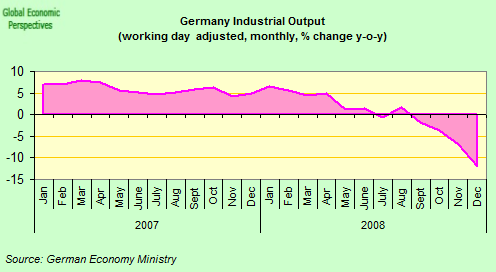
Bei der Gelegenheit aus derselben Quelle der Einkaufsmanagerindex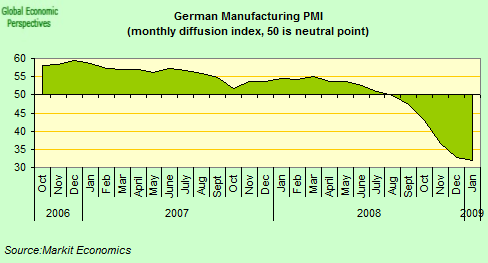
Das verheißt auch für den Januar nichts gutes.
Diesen Abbau von Lagerbeständen sollte man nicht zu hoch bewerten - gerade haben die USA gesagt, daß sich zuletzt ihre Lagerbestände erhöht haben - und das kann man eben so lesen, daß das Zeug demnächst zu Schleuderpreisen auf den Markt kommt und die hiesige Produktion liegen bleibt. Und If there’s a recovery, it’ll be via exports and construction. ist selbstverständlich richtig. Damit ist nur nichts darüber gesagt, wann Exporte und Bau anziehen...
Hier noch die deutsche Industrieproduktion auf lange Zeit gesehen (Quelle: Econompicdata):
Across 2008 as a whole, the Italian economy fell 0.9%, ISTAT said, the most pronounced decline recorded since 1993.The Italian economy officially fell into recession in the third quarter of 2008. And one more interesting detail, Italian GDP is now back at the same level it was in Q4 2005, and falling. This is pretty worrying, and even more so given there are quite a lot more people in Italy then there were in 2005.
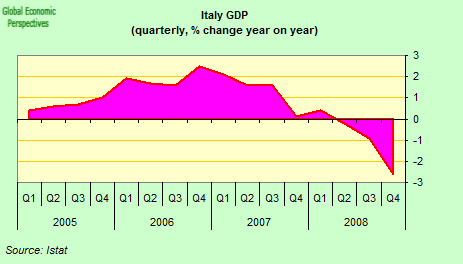
In Unicredit versucht sich an einer Kapitalerhöhung schrieb ich ja bereits von dem Versuch von Unikredit, bei einem Aktienkurs von 1,5 EUR eine Kapitalerhöhrung zu einem Kurs von 3 EUR hinzubekommen.
Die Sache war erfolgreich wie zu erwarten war:
* UniCredit says concludes capital increase
* UniCredit says 0.48 percent of rights offering subscribed for 14.3 million euros
* The offering closed on Jan. 23
Nur einer von 200 Anlegern hat nicht verstanden, daß er die Aktien anders günstiger bekommt.
Welche Auswirkungen mag das wohl auf Unicredit haben? Naja, Unicredit sucht nun noch dümmere Anleger... und sucht sie da, wo ich sie befürchte:
http://www.reuters.com/article/rbssBanks/idUSMAT00908020090129
[...]
In an extract of an interview to be published in Germany's Handelsblatt newspaper on Friday, UniCredit Chief Executive Alessandro Profumo said the bank could consider "state support as insurance against unpredictable events."
If the bank does seek state aid, it could consider doing it in Austria, for example, he added.
Economic difficulties will cause more Canadian consumers to hold off paying their credit card bills, to be exacerbated by a rise in interest rates. Amex said beginning Feb. 11, interest rates on some American Express cards will go up 1 to 3 percent to 21.99 percent.
Ok, das ist jetzt nicht wirklich unerwartet...
Aber die Zahlen dahinter sind interessant:
Meanwhile, credit card delinquencies rose from 5 to 10 percent in fall, which will translate into a 0.5 to 1 percent higher write-off rate, Daley said.
Kanada:
130%: Verhältnis von Schulden zu verfügbarem Einkommen: 130%
+40%: Schuldenwachstum in den vergangenen 4 Jahren (vermutlich auf Kreditkarten bezogen)
10%: Kreditkartenausfälle.
Das heißt wohl, die Kanadier erwischt es viel, viel schlimmer als die USA (siehe USA: Kreditkarten).
The drop in gross domestic product, the largest since quarterly annual records began in 1995, compares with a revised 5.2 percent drop in the third quarter.
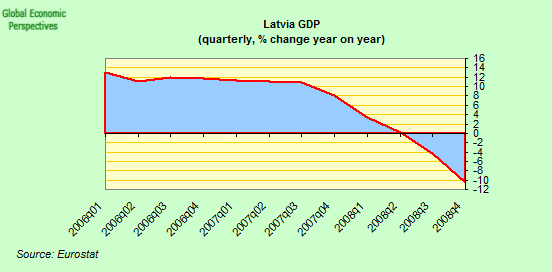
The export of oil products also fell, by 10.7% year-on-year to 8.6 million metric tons.
The decreases were due to redirecting oil to the domestic market.
2.4% weniger Produktion, -10.6% weniger Export. Das Export-Land-Modell und Peak Oil grüßen aus Rußland.
Wenn man es ganz genau betrachtet: Peak Oil, Peak Money, Peak Economy, Peak Putin.
Putin reagiert auf die in Unruhen in Rußland beschriebenen Ereignisse mit angemessenen Maßnahmen zur Verbesserung der wirtschaftlichen Lage:
[...]
Die von der Regierungspartei Einiges Russland zusammengetrommelten Demonstranten zeigten Transparente wie "Das Volk, Medwedew und Putin - gemeinsam werden wir siegen".
Ok, ok, die Bilder aus dem Daily Mail Artikel sehen nach etwas weniger friedlichen Gegendemonstrationen und irgendwie schon nach Verhaftungen aus..., aber wer wird da kleinlich sein?
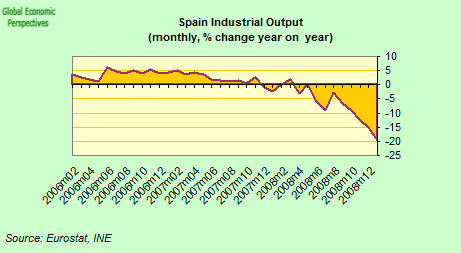
http://www.bloomberg.com/apps/news?pid=newsarchive&sid=ayVnF4ZQ2mug
http://blogs.cfr.org/setser/2009/02/05/still-plenty-to-worry-about/
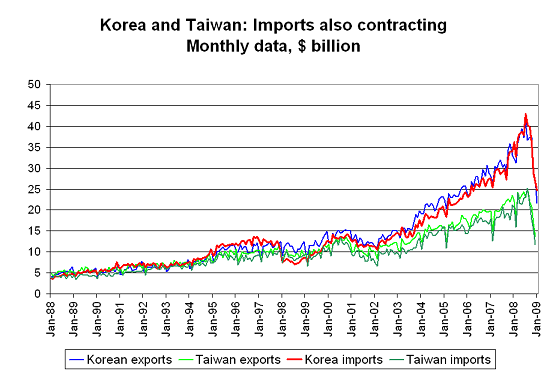
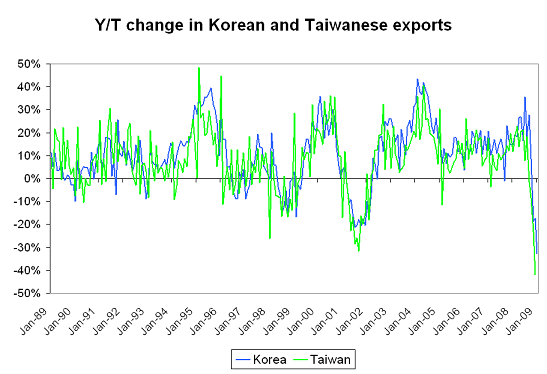
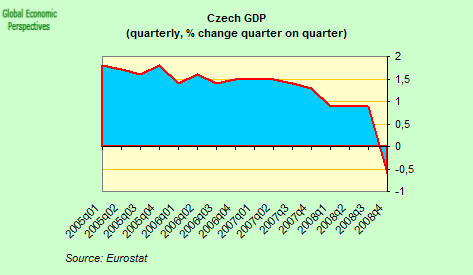
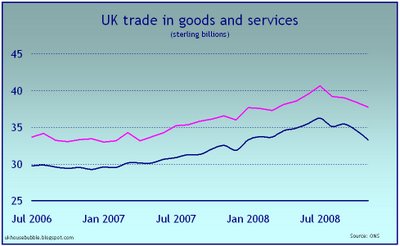
Magenta: Import, Blau: Export.
Both imports and exports are falling, but exports are falling faster. So despite the dramatic fall in sterling, which should have boosted UK competitiveness, we still can not shift sufficient exports to narrow our external deficit.
Wie stark das Hauseigentümer ihr Eigentum in Großbritannien aushöhlten sieht man hier:
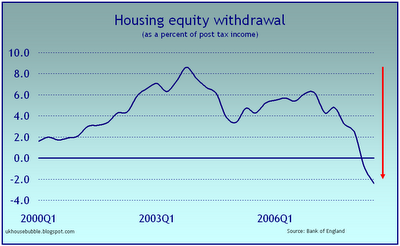
Das ist, Pi mal Daumen, in einem Jahr ein Unterschied von 8% des Nettoeinkommens...
Momentan hat ja wohl fast alles Rekordgeschwindigkeit:
The Royal Institution of Chartered Surveyors says on Monday that more than 70 per cent more of its members reported a fall than reported a rise in occupier demand in the fourth quarter. This marks a significant jump from the third quarter, when just over half saw a fall.
[...]
Rental income is increasingly important to commercial landlords after a torrid 18-month period when the value of their properties has dropped by about a third.
The number of applicants to the schools that form the elite of the state system has risen strongly this year in some local authorities contacted by the FT, in spite of a decline in the overall number of pupils applying. Several schools cite financial insecurity caused by the recession.
Es werden deutlich mehr Kinder auf den besten der staatlichen Schulden Großbritanniens angemeldet. Warum bloß?
Ah, die Privatschulen sind nicht mehr so gefragt.
Nur 9.5 Mrd, das ist ja gerade mal eine Zehntel-HRE. Warum zickt die Börse bei solchen Kleinigkeiten herum?
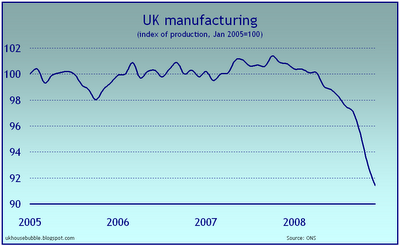
Freier Fall
The most common price for the drug is £40 per gram. Home Office figures for 1998 show the average price was £77.
A gram of heroin can now be bought for as little as £25, with the average price somewhere between £40 and £50 per gram. In 1998, the average was £74.
[...]
According to DrugScope, a charity that provides research and advice on drugs policy, gram of cocaine can make between 10 and 20 lines for snorting, depending on its strength.
That means a line of cocaine can cost as little as £1, with an average price per line of between £2 and £4.
The average price of a pint of lager is around £2.75, although some pub chains have reacted to the credit crunch by cutting the price of a pint as low as 99p. A glass of wine typically costs £3.50.
'ne Nase Koks ist günstig im Großbritannien. Das erklärt die Leistungen der Banker.
In britischen Regierungskreisen macht sich Pessimismus breit:
Mr Balls said yesterday: "The reality is that this is becoming the most serious global recession for, I'm sure, over 100 years, as it will turn out."
oder ist es Realismus?
Es wäre ja halb so wild wenn es nur die Banken wären...
"Die Ökonomie wird unsere Politik im nächsten Jahr, in den nächsten 5 Jahren, in den nächsten 10 und sogar den nächsten 15 Jahren definieren."
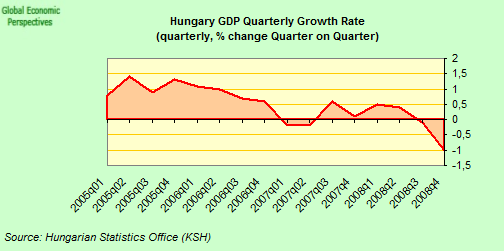
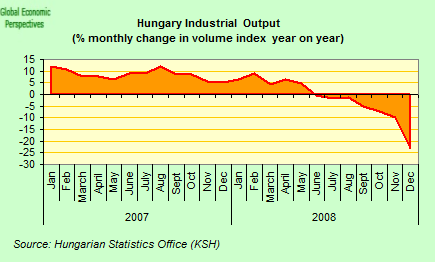
But it has never seen a 10-year stretch as bad as the one that ended last month.
Over the 10 years through January, an investor holding the stocks in the S.& P.’s 500-stock index, and reinvesting the dividends, would have lost about 5.1 percent a year after adjusting for inflation, as is shown in the accompanying chart.
[...]
For the current period, the total return was negative, at minus 2.6 percent a year, even before factoring in inflation.
wer vor 10 Jahren am Aktienmarkt investiert hat, hat durchschnittlich 5.1% verloren (inflationsbereinigt). Das ist Rekord.
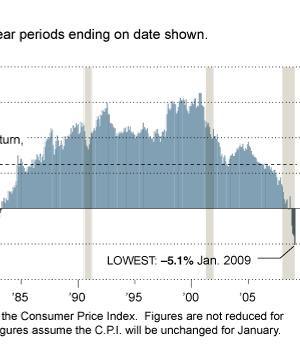
"The numbers are further documentation of the gravity of the housing problem," says Nicolas Retsinas, head of Harvard University's Joint Center for Housing Studies. "This inventory is delaying any kind of housing recovery."
Wenn die Zahl stimmt, dann wird es sehr, sehr lange dauern, bis sich der amerikanische Immobilienmarkt erholt.
2009 wird voraussichtlich ein sehr gutes Erntejahr, sonst würde man nicht so viel Korn für Ethanolproduktion opfern, oder?
USDA projected 4.2 billion bushels of corn will be used to produce ethanol in 2009/10, an increase from 3.6 billion bushels forecasted for the current year.
Overall, ethanol is forecast to command about 33 percent of the corn crop compared to 30 percent in 2008/09.
Oder ist das ein Beitrag zur Senkung der Überbevölkerung in den ärmsten Ländern durch Hungersnöte?
The bad economy is hitting America right in the stomach.
Consumers have cut back sharply on food spending, shunning restaurants, opting for generic products over brand names, trading in lattes for home-brewed coffee and shopping for bargains. That is hurting sales and profits at many food processors, grocery chains and restaurants.
In 2008's fourth quarter, consumer spending on food fell at an inflation-adjusted 3.7% from the third quarter, according to data from the Commerce Department's Bureau of Economic Analysis. That is the steepest decline in the 62 years the government has compiled the figure. The report is based on receipts from a sampling of food-oriented businesses across the country.
Die Lebensmittelausgaben der US-Konsumenten sind im Q4 2008 um 3.7% (inflationsbereinigt) gefallen - mehr als je zuvor, seit die Daten erhoben werden...
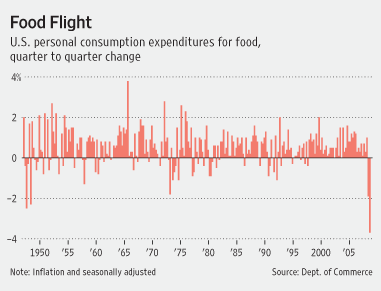
Doch, doch, das geht - weniger Starbucks, mehr Mal-Mart.
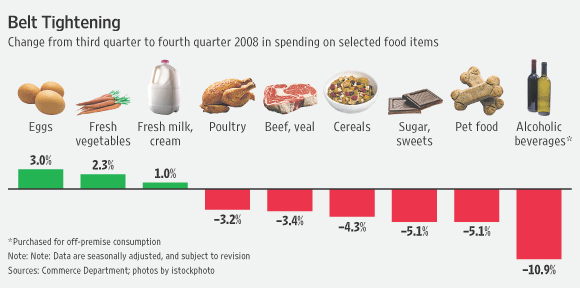
Zur Frage, ob die Börse die Aussichten schon richtig eingepreist hat, gibt es eine Antwort: Nein.
[...]
With 84.8% of the market value and 390 issues reported, operating earnings, which includes income from products or services and excludes financing and other costs, are down 62% from the fourth quarter of 2007, Silverblatt said.
Operative Einnahmen -62%.
A sixth quarter of negative growth ties the prior record set when Harry Truman was president, running from the first quarter of 1951 to the second quarter of 1952.
"Next quarter, we're expecting a new record of seven quarters of negative growth," Silverblatt added.
As of the close of business Thursday, Silverblatt calculates S&P earnings per share, on a reported basis, at a loss of $10.44 for the quarter. If financials were taken out of the equation, that deficit would drop to $2.35 a share.
Verlust pro Aktie im S&P 500: $10.44 über alle Unternehmen, und 2.35 wenn man die Finanzbranche heraus läßt.
Das ist depressiv.
Econompicdata hat das aufbereitet: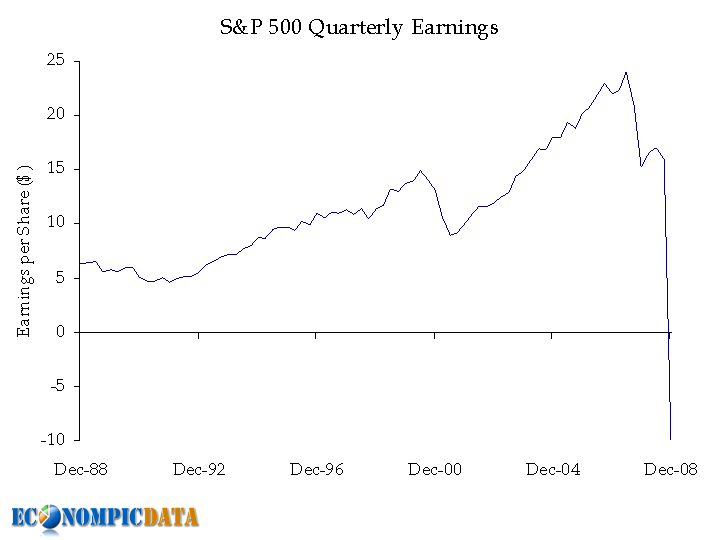
Wenn die US-Bankmüllsammelstelle FDIC versucht, ihre "Assets" loszuwerden, bekommt sie wieviel dafür?
DebtX of Boston and First Financial Network of Oklahoma City, for instance, sell loans at auction to investors who typically pay 5 cents to 85 cents for each dollar of outstanding principal, according to Bliss A, Morris, First Financial’s president. It is unloading hundreds of houses across the country at bargain basement prices. In November, Lula Smith, 86, of Kansas City, Mo., bought a two-bedroom house across the street from her home for $4,000, one-tenth of its value two years ago.
5 bis 85% vom Wert des Kredites. Ob das den Steuerzahler freut?
Zwangsverkäufe machen fast die Hälfte des US-Einfamilienhausverkäufe im 4. Quartal 2008 aus.
Distressed sales – foreclosures and short sales – accounted for 45 percent of transactions in the fourth quarter, dragging down the national median existing single-family price to $180,100, which is 12.4 percent below the fourth quarter of 2007 when conditions were more balanced; the median is where half sold for more and half sold for less.
Und damit geht der Preisverfall fröhlich weiter.
Fannie Mae and Freddie Mac, the mortgage-finance companies seized by regulators, may need more than the $200 billion in funding pledged by the U.S. government if the housing market continues to deteriorate, Federal Housing Finance Agency Director James Lockhart said.
The companies’ needs will depend largely on the direction of home prices, Lockhart said in an interview in Las Vegas yesterday. His comments followed statements from Fannie Mae in November and Freddie Mac Chairman John Koskinen last week that the government’s funding commitment through 2009 may fall short of what the companies need to make good on their obligations.
Welche Überraschung - die Sammelstätten für Hypothekenmüll brauchen mehr Geld.
Ich wage die Behauptung, daß es bei 200 Mrd. für 2009 nicht bleiben wird.
“There is no prospect for a profit on the assets,” Eisenbeis wrote in a report yesterday. “Losses are mounting.”
Also, bei der FED arbeiten ja nur die Besten der Besten (hoffe ich zumindest). Und sogar die verschätzen sich etwas:
Etwas? Naja, etwas stärker:

Natürlich hat die FED kein besonders inniges Verhältnis zur Wahrheit und überhaupt kein Interesse an einer Bewertung der Assets zu Marktpreisen, von daher kann man deren Äußerungen nicht ernst nehmen (sondern als Politikergefasel oder Realitätsverleugnung abtun), aber die Tatsache, daß diese "Assets" in 7 Monaten laut FED 13% ihres Wertes verloren haben, spricht Bände.
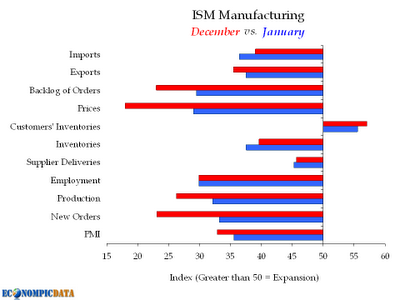
The Institute for Supply Management\'s manufacturing index inched higher to 35.6% in January from 32.9% in December, the Tempe, Ariz.-based ISM reported.
Ein Hinweis an die Leserschaft: Eine Schwalbe macht noch keinen Sommer. Und die Volatilität, die in den Märkten seit anderthalb Jahren zu beobachten ist, könnte auch hier mal wieder in Erscheinung treten...
Bespoke über die Glaubwürdigkeit der amerikanischen Arbeitsmarktzahlen:
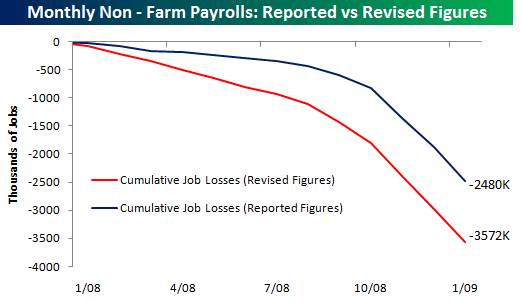
Es ist zwar schön, daß die USA alle Woche ihre Arbeitsmarktzahlen veröffentlichen, aber schöner wäre es noch, würden sie nicht massiv daneben liegen.
Ok, ein neuer Rekord - es wird nicht der letzte bleiben.
Aber ganz so schlecht klingt das gar nicht - kaum schlechter als 1998...
Credit card delinquencies hit a record high in December, and charge-offs are soaring. percentage of debt more than 60 days late in 2008:
July 3.12%
Aug. 3.13%
Sept. 3.18%
Oct. 3.35%
Nov. 3.28%
Dec. 3.75%
Based on $283 billion of credit card debt that is securitized, or sold off, by issuers; Source: Fitch Ratings' credit card index
Der Anstieg im Dezember ist allerdings drastisch gewesen.
Auch die Abschreibungen sind hoch:
Fitch expects charge-offs to approach 9% in the second half of 2009.
und werden wohl noch wachsen.
http://www.bloomberg.com/apps/news?pid=newsarchive&sid=ax5b4S5AhQbE
Mitten in einem Artikel, der sich über steigende Kurse von Master und Visa freut, findet sich dieses Stück Information:
5.2% weniger Transaktionsvolumen. Entweder die US-Bürger sind am Ende ihrer Kreditkartenlimits, oder sie werden vernünftig.
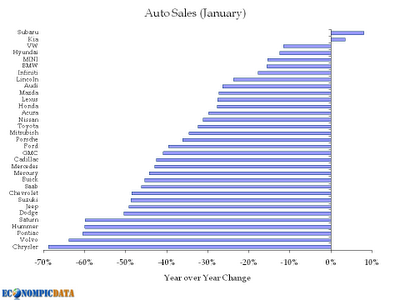
Kurz gesagt: desaströs. Highlights:
Chrysler, die Marke: -68.9% gegenüber Januar 2008 (-70% nach Zahl der Verkaufstage gerechnet).
Chrysler, die Gruppe: -54.8% gegenüber Januar 2008.
http://econompicdata.blogspot.com/2009/02/top-20-auto-brands-then-and-now.html
Januar 2008 versus Januar 2009, nach Stückzahlen pro Marke.
Januar 2009 als Tabelle:
http://www.autoblog.com/2009/02/03/by-the-numbers-january-2009-not-so-happy-new-year-edition/
Hm, 1100 verkaufte Hummers - den Leuten geht's wohl zu gut. Auszüge:
Auf Monatsbasis Pro Verkaufstag
2009 2008 2009 2008
BMW Group -15.5% 14,314 16,935 -18.7% 551 677
Chrysler LLC -54.8% 62,157 137,392 -56.5% 2,391 5,496
FoMoCo -40.2% 93,506 156,391 -42.5% 3,596 6,256
General Motors -48.8% 129,227 252,565 -50.8% 4,970 10,102
Honda America -27.9% 71,031 98,511 -30.7% 2,732 3,940
Nissan NA -29.7% 53,884 76,605 -32.4% 2,072 3,064
Toyota Mo Co -31.7% 117,287 171,849 -34.4% 4,511 6,874
http://www.ft.com/cms/s/0/e99e8514-f234-11dd-9678-0000779fd2ac.html?nclick_check=1
[...]
GM said it estimated the overall annualised selling rate for cars at 9.8m in the US in January, compared with 10.3m in December, and less than China’s estimated selling rate of 10.7m last month.
[...]
However, auto market analysts in China said the figures were not comparable because the Chinese figure included all vehicles produced in China - including heavy commercial vehicles and buses - while the US figure did not. Chinese passenger car production last year was 5.8m.
[...]
Autodata, a market research firm, put total estimated annual industry car sales at 9.6m, their lowest level since 1982.
außerdem bezweifele ich, daß die chinesischen Zahlen für Januar 2009 so hoch ausfallen.
Aber nein:
http://abovethelaw.com/2009/02/so_what_are_we_calling_today_e.php
Based on my informal count, some 585 attorneys and staffers were laid off yesterday or today. And that is not counting however many people are hitting the street from Holland & Knight today (we are still waiting on a firm statement of official numbers), or however many 3Ls were essentially fired from Luce Forward today when their offers were rescinded.
http://abovethelaw.com/2009/02/holland_knight_confirms_243_la.php
820 an zwei Tagen - nur bei den großen Kanzleien.
Das böse Wort von der Enteignung der Banken macht in Berlin die Runde. Strikt ökonomisch gesehen ist das ein Hirngespinst, denn enteignen lässt sich nur, was noch einen Wert hat. Der ist in der Finanzbranche aber schon längst flöten gegangen. Das gilt zuvorderst für die Hypo Real Estate, leider aber - Ausnahmen mag es geben - auch für große Teile des übrigen Bankensystems.
Quelle
Gruß, Uwe
Wollen Sie den Digest abbestellen?
